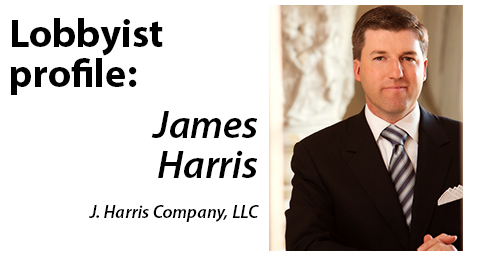By Eli Yokley
JEFFERSON CITY, Mo. — From working the halls of the Missouri Capitol, to monitoring the government in Ulan Bator, Mongolia, James Harris has taken his political expertise to an international stage.
A 2000 graduate of St. Louis University with a degree in Business Administration, Harris got his start in Missouri politics working as political director for Matt Blunt’s 2004 campaign. After winning 101 of the state’s 114 counties, Blunt appointed Harris director of Boards and Commissions, a powerful post where Harris learned the ins and outs of state government.
Harris founded his firm, The J. Harris Company, LLC., in 2006 after he left the post.
“I thought that I could impact public policy more from the outside, and also work on lots of different projects,” he said. “I love to have 10 different pots on the stove.”
Currently, Harris is involved in multiple lobbing efforts, including extension of the land assemblage tax credits for Paul McKee’s NorthSide regeneration efforts, the various tax credit bills, efforts to change Missouri’s judicial selection process, and doing work for the Humane Society of the United States.
Harris, who also works as a campaign consultant, admits he has taken flack from Republicans for his work on issues for the HSUS, but believes it is the right thing to do.
“I do see abused animals. I have a soft spot,” he said, adding that he developed it as a kid. During Junior High, he said his father adopted an abused horse.
“I had never seen such a malnourished and abused horse,” he said. “When you say skin and bones, that’d be generous. I sit through these committee hearings and they say, ‘that stuff doesn’t happen.’ It does.”
Harris said there is a Republican case for working on behalf of groups promoting standards for treatment of animals that does not have to be demagogued as “anti-farm.” The divide among Republicans may correlate with an internal urban verses rural divide, where urban and national Republicans are more willing to be supportive of HSUS’s causes.
“Teddy Roosevelt was a conservationist. I don’t think that makes him not a Republican,” he said. “I get in a little trouble for it, but I believe there are certain morals, certain rights out there, and it is common sense.”
For instance, Harris said he believes consumers would be willing to pay more for a pet if companies would develop business models that tout their production process, similar to what grocery stores like Whole Foods do.
“Consumers will pay more for services. I think a lot of breeders haven’t developed a plan to help them add value with certain standards. They could probably gain more money and ultimately take better care of their dogs.”
In addition to his work in Jefferson City, Harris is also heavily involved in Mongolian politics. During 2009, he served as an election observer during Tsakhiagiin Elbegdorj’s — the country’s first president not from the Mongolian People’s Revolutionary Party, a major power shift for the developing nation. Harris said his time there has made him truly appreciate being an American and capitalism.
“We see poverty and people working hard and wanting to succeed,” he said. “You can tell that change to capitalism from communism, they want to succeed. It is an exciting time to be involved and helping businesses over there.”
Harris said part of his role there now is helping American businesses navigate the regulatory environment in the nation — a place he sees as a major opportunity for American because it is “the Saudi Arabia of minerals.”
“They have the world’s second largest deposit of coal, third largest deposit of copper, massive deposits of gold, all these other minerals, and their country is in transition,” he said. “Western companies, U.S. companies specifically, always think everyone should act and work in their terms, and sometimes they need help bridging the culture divide and understanding the dynamics of the country.”
In Mongolia, Harris said his political skills have helped him build relationships with various members of parliament. American businesses, he said, need to be patient and build trust with officials so that they can make their case that their operation in the country is good for the citizens, not just the company.
Back home, Harris believes lobbying will increasingly be based on grassroots support, particularly in the era of term limits. Labor groups and gay rights groups, just last week, flooded the capitol with supporters.
“In the era of term limits, sometimes lawmakers, particularly in the House, take a little longer to learn the legislative process, so you have to really grasp the issues and know all the different sides of the issue.”
During his free time, Harris says he likes to spend time with his wife, Jillian, his four year old daughter and six month old son. Harris likes to read, appreciate fine wines, and golf. When asked whether he had a favorite restaurant in Jefferson City, Harris quickly replied: “My wife’s kitchen.”
“I’m a food snob. My wife is a gourmet cook. She’s got me to a point where I do not want to eat out,” he said. When they do eat out, Harris — an enthusiast for French and Italian wines — said they like to travel to St. Louis.
“I’m probably boring,” he said, but does golf from time to time. “I’m trying to play golf. My wife is better at it than I am. I’m trying to learn and spend more time with it.”

